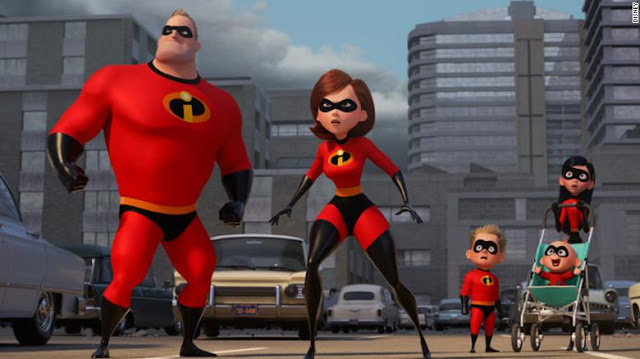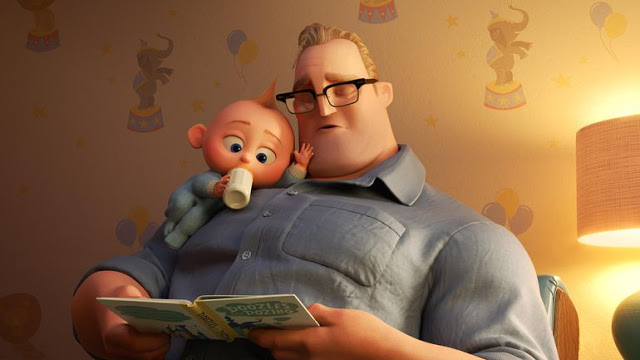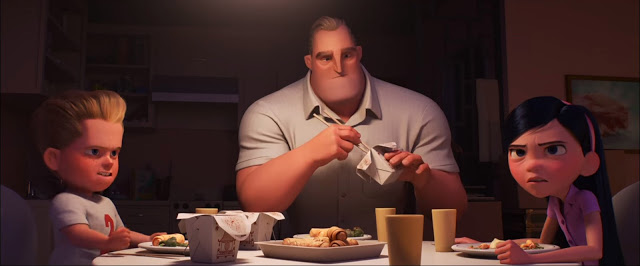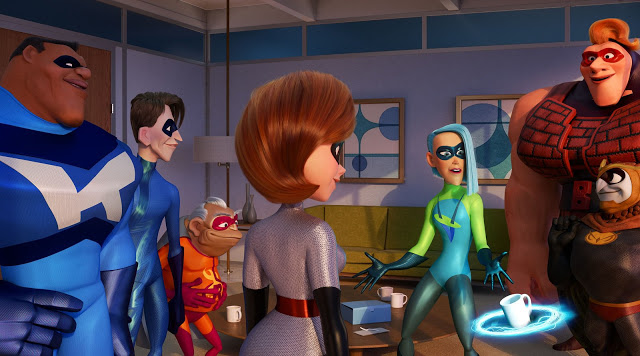Taking stock of a dramatic change in circumstances, a young boy early in Incredibles 2 poses a seemingly simple question: “Are things… bad?” Well, son, it depends on whom you ask. Like the best of Pixar’s movies, Incredibles 2 situates itself squarely on the boundary between the fantastical and the real, wielding an arsenal of artistic tools—bravura technique, sharp wit, limitless imagination—to supply meaningful commentary and poignant themes about everyday life. These days, characterizing everyday life as bad could be construed as a pitiful understatement. But while Incredibles 2 does not entirely ignore our current political environment—one enterprising character adopts the slogan, “Make Superheroes Legal Again”—its allegorical concerns are more universal, expanding on the original film’s thoughtful exploration of marriage and parenthood. And because it perpetuates the franchise’s familial odyssey with even greater verve and intelligence, things in this sequel are far from bad. In fact, things are very, very good.
Again written and directed by America’s animation laureate, Brad Bird, Incredibles 2 picks up immediately after its predecessor left off, with the Parr family—a clan of clandestine superheroes led by Mr. Incredible (voiced by Craig T. Nelson) and Elastigirl (Holly Hunter), more commonly known as Bob and Helen—attempting to halt the exploits of a silly baddie calling himself the Underminer. It’s a bit surprising that Bird refused to allow any fictional time to pass between the two installments (the first Incredibles, of course, was released 14 years ago), but it spares him the bother of exposition, allowing him to instead dive straight into some brawny superhero mayhem. The movie’s opening set piece is a rambunctious joyride through the city’s streets and sewers, with Bob frantically attempting to subdue the Underminer and inadvertently causing massive amounts of property damage in the process.
Beyond an excuse for some noisy chaos, which Bird choreographs with deceptive clarity, the externalities of Bob’s noble and sweaty efforts form the fulcrum of the film’s plot. In this curmudgeonly universe, powered people remain non grata, to the consternation of Winston Deavor (Bob Odenkirk), a wealthy superhero admirer who longs to change the status quo. Working with his innovative sister, Evelyn (Catherine Keener), Winston surmises that public opinion can be turned in favor of supers through increased transparency; by installing Evelyn’s invisible surveillance cameras inside the Parrs’ suits, they’ll help ordinary people understand the difficult choices that heroes must make while thwarting evil. Bob, long resentful of humanity’s lack of appreciation for his work, is gung-ho for the plan, but the Deavors’ market research suggests that his bullheaded style isn’t likely to turn the tide. Instead: “We need Elastigirl!”
Do we ever. I enjoy a good smash-and-grab job as much as the next Neanderthal, but Mr. Incredible’s brute strength isn’t the most visually dynamic superpower, particularly given the inherent weightlessness of animation. Elastigirl, on the other hand, is an ideal action hero. She can bend, stretch, and worm her way through crevices and around obstacles, and Bird leverages her squirmy talents for maximum excitement. In the film’s most exhilarating sequence (which will remind genre fans of Spider-Man 2), Elastigirl races—on a totally awesome motorbike, naturally—to stop an out-of-control high-speed train as it hurtles toward imminent disaster. As she leaps, climbs, and swivels into and out of danger, the scene accumulates a breathless momentum, pulling you in so completely that you momentarily forget you’re watching computer-created code as opposed to real people.
Real people, of course, remain the predominant focus of Incredibles 2. And while the decision to send Elastigirl out into the fray is a savvy one for aesthetic purposes, it’s even smarter in terms of narrative. With Helen off saving the world and swinging the polls, Bob is charged with caring for their three differently abled children: invisibility-cloaking, force field-wielding Violet (Sarah Vowell), just discovering the agony of adolescence; speedster Dash (Huck Milner, replacing now-grown Charly Bliss guitarist Spencer Fox), incapable of outrunning the daunting challenge of math homework; and baby Jack-Jack (Eli Fucile), gurgling happily and deluding his parents into believing that he’s a perfectly normal infant. It’s a tall order. Sure, Helen is bedeviled by a sinister figure calling himself the Screenslaver—a masked man capable of hacking into any electronic device in the city and manipulating its user into committing ghastly acts of violence—but what is that compared to Bob healing his daughter’s fractured heart and correcting his son’s faulty fractions?
This contrast—the notion of the breadwinning mom and the stay-at-home dad—is hardly revolutionary, and Bird’s script perhaps affords it greater novelty than it deserves. But Incredibles 2 still tackles Bob’s parenting predicament with sensitivity, warmth, and humor, positing him not as a clueless boob but as a sincere and affectionate father who cares deeply for his wife and children. It is not entirely his fault that he’s out of his depth, especially when his toddler starts shooting lasers from his eyes and bursting into flames.
Yes, as revealed at the end of the first film, the Parrs’ adorable and unintelligible baby possesses a wide array of potent and uncontrollable powers. And Jack-Jack’s random cycling of abilities—by way of example, he can travel to other dimensions—highlights one of Incredibles 2’s greatest assets: It is really funny. Bird’s dialogue strikes the proper balance between flavorful and natural, and his animators twist the characters’ faces into an amusing collection of winces, snorts, and gasps. The diminutive and magnificent Edna Mode (voiced by Bird himself) makes a brief and triumphant return, breezing into the second act with withering condescension and thinly veiled enthusiasm. Violet, mortified when her dad engineers a catastrophic meet-cute, delivers one of cinema’s all-time-great spit takes, a moment whose hilarity is topped only by Jack-Jack squaring off in the backyard against a feisty but badly overmatched raccoon.
And of course, there is a seemingly prosaic scene of the Parr family eating dinner together, a medley of sniping, taunting, and grumbling that remains the franchise’s most durable source of comedy. Yet this shared meal also ties in thematically with the Screenslaver, a villain who’s more threatening intellectually than viscerally. From a plotting perspective, the Screenslaver isn’t all that interesting; his secret identity isn’t particularly hard to guess, and his long-simmering vendetta against superheroes isn’t too different from that of Syndrome, the big bad from the first film. But in the era of social media and Black Mirror, there is something genuinely disturbing about the Screenslaver, an anonymous malevolent force that can invade your privacy and bend you to its will. If nothing else, parents who lecture their children about the perils of excessive screen time can leave the theater armed with a dastardly bogeyman.
Yet even if you’re unmoved by Incredibles 2’s insights into the (dis)connectivity of the modern age, you can still revel in Bird’s mastery of high-octane action. One of the most impressive things about the movie is that, while it predictably tilts into third-act busyness—revved-up engines, vehicular crashes (meet the Incredibile!), lots of punching and kicking—the clamor never feels tedious or perfunctory. Many features at the multiplex are couched in the superhero realm, but Incredibles 2 is the rare one that actually capitalizes on its universe’s infinite sense of possibility. In yet another clever move (if one that echoes both the X-Men and Spy Kids franchises), Bird introduces a troupe of junior supers, each with their own unique abilities; their most memorable member is Voyd (Sophia Bush), a blue-haired upstart who can open sudden portals in the air and whose appearance reminded me strongly of Kristen Stewart. The film’s climax is thus a flurry of paranormal activity, but it never feels cluttered or familiar. Instead, Bird seizes on his characters’ diverse skills—including those of Frozone (Samuel L. Jackson), the Parrs’ trusty friend who can effortlessly transform humidity into ramps of ice—and delivers a thrilling maritime sequence that hums with variety and ingenuity.
Bolstered by another vividly expressive Michael Giacchino score, Incredibles 2 is somehow the best of both worlds, an earnest family film that’s also a hugely entertaining romp. It’s a picture about parents who just want to make the planet safer for their children, and who use their considerable talents to help secure a better tomorrow. And in articulating their strenuous efforts, Bird reiterates his own formidable gifts. With expert craft and exquisite empathy, he reminds us just how super movies can be.
Jeremy Beck is the editor-in-chief of MovieManifesto. He watches more movies and television than he probably should.


![[Anthony Lane could not be reached for comment] [Anthony Lane could not be reached for comment]](https://moviemanifesto.com/wp-content/uploads/2018/06/Incredibles228Elastigirl29.jpg)


